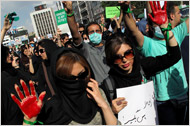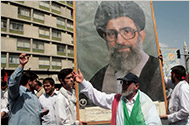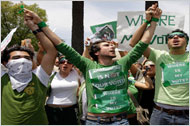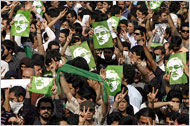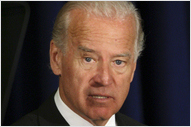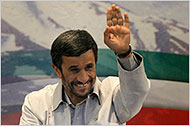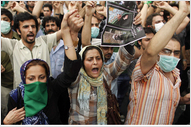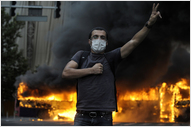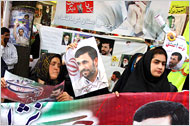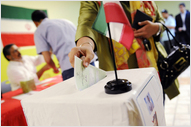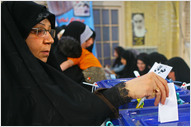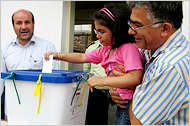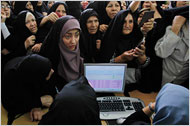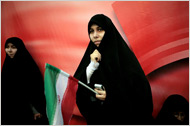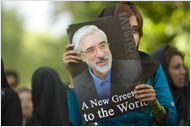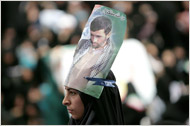
Iran has had a quasi theocracy since the ouster of Shah Mohammed Reza Pahlavi in the Islamic Revolution of 1979. In June 2009, widespread protests over the results of a presidential election grew into the greatest challenge to its authority that the Shiite regime has faced.
On June 13, 2009, after an unusually bitter campaign, the authorities announced that President Mahmoud Ahmadinejad had been reelected. The announcement of his victory -- in which it was said that he had received more than 60 percent of the vote -- prompted mass protests by demonstrators who claimed that he had stolen the election. Mr. Admadinejad's main challenger, Mir Hussein Moussavi, a former prime minister with a reputation for honesty and competence, rejected the results and called on supporters and fellow clerics to fight them. In the final weeks of the race, Mr. Moussavi's campaign had gained tremendous energy, and huge rallies by his supporters had packed the streets of Tehran day and night.
Initially, Mr. Ahmadinejad and the country's supreme ruler, Ayatollah Ali Khamenei, brushed off the outraged reaction to the results. But in the face of massive demonstrations, two days later Mr. Khamenei called for a high-level inquiry into accusations of election irregularities. But that failed to appease the protesters, as did an offer the next day to conduct a partial recount. Thousands of both pro- and anti-government demonstrators gathered in the streets, increasing tensions. Clashes with members of the Revolutionary Guards and their militia supporters left at least seven people dead during the largest antigovernment demonstrations since the Iranian revolution.
The turmoil comes after a period in which the country's stature in the Middle East has grown but discontent has crept up internally. The greater prominence in the region comes as a result of a combination of factors: the American invasion of Iraq, which ousted Saddam Hussein, a longtime enemy, and replaced him with a friendly Shiite government; the rise in oil prices between 2001 and 2008; and its aggressive foreign policy, which included support for radical groups like Hezbollah in Lebanon and Hamas in the Palestinian territories. The country's nuclear power program is another source of international tension, leading the United Nations Security Council to impose sanctions after Iran ignored its order to halt the enrichment of uranium. Internally, the hard-line clerics who control the government tightened their hold after Mr. Ahmadinejad, a conservative, succeeded Mohammad Khatami, a moderate, as president in 2005. Much of the economy is propped up by the country's rich oil reserves, and lower export prices have led to mounting criticism of Mr. Ahmadinejad.
The Nuclear Challenge
Mr. Ahmadinejad has sought to rally support by defiance of the West and the United States over Iran's nuclear program. In 2003, under President Khatami, Iran admitted that it had been cladestinely pursuing an atomic program and agreed to suspend it. In 2006, the country restarted a nuclear research program that it insisted was purely for peaceful purposes.
It defied a series of Security Council resolutions calling for a halt, and rebuffed diplomatic overtures from Europe and the United States. In May 2007 international inspectors reported that the country's scientists had mastered the process of enrichment, in which uranium is concentrated to the levels needed for power generation or, eventually, for an atomic bomb.
Late that year, American intelligence agencies issued a new National Intelligence Estimate that concluded that the weapons portion of the Iranian nuclear program remained on hold. Contradicting the assessment made in 2005, the report stated that the Iranian government did not appear determined to obtain nuclear weapons, although it said Iran's intentions were unclear, and that the country probably could not produce a bomb until the middle of the next decade.
On May 20, 2009, Iran test fired an upgraded surface-to-surface missile with a range of about 1,200 miles. The reported range of the Sejil-2 missile would put it within striking distance of Israel and of American bases in the Persian Gulf. The launch would appear to represent Iran's first successful test of a solid-fuel missile, which would be much more mobile and easier to hide than their current generation of liquid-fueled rockets. Until now, the country's longest-range missile has been the liquid-fueled Shahab-3, which is based on a design that it obtained from North Korea.
American officials and international inspectors are concerned that Iran seems to have made significant progress in the three technonologies necessary to field an effective nuclear weapon: enriching uranium to weapons grade; developing a missile capable of reaching Israel and parts of Western Europe; and designing a warhead that will fit on the missile.
The greatest mystery surrounds the warhead program, which intelligence agencies said in late 2007 had been halted at the end of 2003. It is unclear whether Iran has restarted its weaponization program.
Relations with the U.S. and Israel
Mr. Ahmadinejad has often denounced Israel. In 2008, President Bush deflected a secret request by Israel for specialized bunker-busting bombs it wanted for an attack on Iran's main nuclear complex and told the Israelis that he had authorized new covert action intended to sabotage Iran's suspected effort to develop nuclear weapons, according to senior American and foreign officials.
Tensions between Washington and Tehran -- which go back many decades, from Washington's participation in the 1953 coup that installed the shah, to the seizure of American diplomats in 1979 after the shah fell to an Islamic revolution -- also rose in 2007 and 2008 over Iran's involvement in Iraq. American military officials accused elements of Iran's Revolutionary Guard of supplying Shiite militants in Iraq with powerful roadside bombs to use against American forces.
During the 2008 American presidential campaign, Barack Obama broke with rival candidates to say he favored unconditional talks with Iran, though he condemned its nuclear program. In his first interview after taking office, on Al Arabiya television, an Arabic-language channel based in Dubai, Mr. Obama said that "if countries like Iran are willing to unclench their fist, they will find an extended hand from us."
President Ahmadinejad responded by calling for an apology for decades of American misdeeds, but did not explicitly reject the overture. The move signaled the start of a long-delayed war-or-peace drama that may help define the Obama administration's plans to remake America's approach to diplomacy, but could cause problems between the U.S. and Israel.
The 2009 Presidential Election
The major candidates in the hotly disputed 2009 presidential election were the incumbent, Mahmoud Ahmadinejad, and Mir Hussein Moussavi, a former prime minister.
Mr. Moussavi's moderate views won him support from other reformers in Iran, including former President Mohammad Khatami. Public rallies in his support were of unexpected size and enthusiasm. The leading candidates exchanged accusations that were extraordinarily fierce for Iranian politics.
In early June, the presidential campaign reached a level of passion and acrimony almost unheard of in Iran. In part, that appeared to be because of a surge of energy in Mr. Moussavi's campaign. Rallies for Mr. Moussavi drew tens of thousands of people, and an unofficial poll suggested his support had markedly increased, with 54 percent of respondents saying they would vote for him compared with 39 percent for Mr. Ahmadinejad.
Many Iranians said the campaign's raucous tone was due largely to Mr. Ahmadinejad's unexpectedly fierce rhetorical attacks, which infuriated his rivals and their supporters, and drew some blistering ripostes.
Many observers said a critical moment was a nationally televised debate on June 3, in which the president opened with a furious attack on Mr. Moussavi. Mr. Ahmadinejad seemed to spare no one, accusing his conservative and liberal opponents of being corrupt. The most shocking thrust, to some viewers, was when he held up a document with a small picture of Mr. Moussavi's wife, Zahra Rahnavard, and asked him in a derisive tone, "Do you know this woman?" Mr. Ahmadinejad then accused Ms. Rahnavard - a respected professor of political science - of entering a graduate program without taking the entrance exam and other, lesser violations of university policy. Ms. Rahnavard held a news conference in which she threatened to sue if Mr. Ahmadinejad did not apologize.
Mr. Moussavi served as prime minister from 1980 to 1988. He is well remembered by many Iranians for managing the country during its eight-year war with Iraq, and for introducing food rationing.
An architect and painter, he has not held a government post since the Constitution was amended to eliminate the position of prime minister in 1989.
After Mr. Moussavi announced in March 2009 that he intended to stand in the June election, Mr. Khatami, a leading moderate candidate, withdrew from the race. Aides said he quit so as not to split the vote against Mr. Ahmadinejad.
Mr. Moussavi has said that he favors freedoms of speech and the press and would try to change the law that bans private television stations.
But he has also said he would not back down from the country's nuclear program, which began during his tenure as prime minister. Instead, he said, he would try to build international confidence that Iran's nuclear ambitions were peaceful.
"Weaponization and nuclear technology are two separate issues, and we should not let them get mixed up," he said.
Mr. Ahmadinejad was elected president of Iran in June 2005 on a mandate to distribute the country's growing oil income among the poor. The son of a blacksmith, he was an unknown figure in the country's politics who had only served as Tehran's mayor for two years and earlier as a provincial governor for four years. But with the support of the country's religious and military circles -- who had been frustrated with the policies of Mr. Khatami, his moderate predecessor, Mr. Ahmadinejad appealed to a large rural constituency who voted for him in hope for economic change.
But Mr. Ahmadinejad soon became known on the international stage as the face of Iran's defiance over its nuclear program and hostility towards Israel. He shocked the world when he called the Holocaust a "myth' and repeated an old slogan from the early days of the 1979 revolution, saying "Israel must be wiped off the map."
After his election, Iran broke the United Nation's nuclear agency seals on its nuclear facility and resumed sensitive enrichment activities - a process that can be used for making nuclear bomb or nuclear fuel. Iran contends that its program is peaceful and that it merely wants to produce fuel for its nuclear power plants. But because of secretive past activities, the United States and some European countries accuse Iran of having a clandestine weapons program. The country has been the target of three sets of United Nations Security Council sanctions over its program.
In the last few years, the country has been hit by high inflation, soaring unemployment and unrest. In recent months, lower export prices of oil lessened Mr. Ahmadinejad's popularity.
Before the voting, supporters of Mr. Moussavi were hopeful, given the large and energetic crowds that had been turning out at his rallies. But then on June 13, the day after the voting, Mr. Ahmadinejad was declared the winner, with 63 percent of the vote to 35 percent for Mr. Moussavi.
On June 15, in an unusual radio address broadcast every 15 minutes, Ayatollah Khamenei was quoted as telling Mr. Moussavi to pursue his objections to the election result calmly and legally. The broadcast said that at a meeting on June 14, Mr. Khamenei told Mr. Moussavi, "Naturally, in this election, complaints should be followed through legal channels" adding that Mr. Khamenei told Mr. Moussavi to "follow the issue calmly."
On June 15, the ayatollah called for the vote to be examined in a turnabout from the government's earlier position that the vote had been free and fair. Mr. Khamenei had instructed the powerful Guardian Council to examine opposition complaints of widespread electoral irregularities. The council, in its ruling the following day, said the law prevented it from voiding the last vote and holding a new one.
The council later announced that it was prepared to order only a partial recount, according to state television and news reports. Mr. Moussavi and other opponents of Mr. Admadinejad rejected the proposal.
By June 17, Iran had expanded a crackdown on journalists and for the first time directly accused the United States of interference in the disputed presidential election. President Obama said a day earlier that it would be counterproductive for the United States "to be seen as meddling." But he also said he was "deeply troubled by the violence" and that democratic values needed to be observed.
Mr. Moussavi, in a message on a Web site associated with him, called on his supporters to rally again on June 18, and to go to their local mosques to mourn protesters killed in the demonstrations. His call directly challenged Ayatollah Khamenei, who had urged him to work through the country's electoral system in contesting what was declared a landslide victory for Mr. Admadinejad.
Highlights From the Archives
Recount Offer Fails to Quell Political Tumult in Iran
On a second day of huge demonstrations, the government placed tight restrictions on media coverage, especially by foreign journalists.
June 17, 2009worldNewsProtests Flare in Tehran as Opposition Disputes Vote
The streets of Iran’s capital erupted in the most intense protests in a decade as riot police officers clashed with demonstrators who accused Mahmoud Ahmadinejad of stealing the election.
June 14, 2009worldNewsReverberations as Door Slams on Hope of Change
Iran’s election ended with smoldering anger, crushed hopes and punctured illusions on the ground in Tehran and in the policy centers of Western capitals.
June 14, 2009worldNewsAs Iran Votes, Talk of a Sea Change
With polls now open in Iran, some say new democratic energies could affect the country’s politics whether or not President Mahmoud Ahmadinejad is defeated.
June 12, 2009worldNews AnalysisU.S. May Drop Key Condition for Talks With Iran
New proposals would allow Tehran to continue enriching uranium during negotiations, officials say, a sharp break from the Bush administration’s approach.
April 14, 2009worldNewsIran Offers ‘Dialogue With Respect’ With U.S.
President Mahmoud Ahmadinejad of Iran made a conditional offer of dialogue to the Obama administration.
February 11, 2009worldNewsIran Launches Satellite in a Challenge for Obama
The launching of Iran’s first domestically produced satellite came amid concerns about nuclear ambitions.
February 4, 2009worldNewsU.S. Finds Iran Halted Its Nuclear Arms Effort in 2003
A new assessment by American intelligence agencies, which concludes that Iran’s weapons program is on hold, contradicts a report two years ago that Tehran was working inexorably toward building a bomb.
December 4, 2007worldNewsHard Times Help Leaders in Iran Tighten Grip
Iran’s increasing economic and political isolation is helping leaders to hold back what they see as corrupting foreign influences.
September 5, 2007worldNewsArticles
Protesters Gather Again, as Iran Panel Offers Talks
Hundreds of thousands of protesters massed in Tehran as the government made its first move toward a dialogue with the opposition.
June 19, 2009Koreas Advance Together, but Not in Unity
North and South Korea, divided by ideology and the fear inspired by the North’s development of nuclear weapons, have, for the first time, both qualified for the same World Cup tournament.
June 19, 2009Iranians in California Feel a Bond With Protesters in Tehran
In Southern California, home to the largest Persian diaspora in the country, keeping up with events in Iran has become an obsession.
June 19, 2009Cultures Clash in Tehran
Even if the protests die down, a generational upheaval is coming, pitting Iran’s ‘‘Baby Boomers’’ against its ‘‘Greatest Generation.
June 18, 2009With Iran, Think Before You Speak
For reformers in Tehran to have any hope for success, Iran’s election must be about Iran not America.
June 18, 2009Tear Down This Cyberwall!
Despite Tehran’s push to block certain Web sites and to evict foreign reporters, a secret Internet lifeline remains through another source.
June 18, 2009U.N. Atomic Energy Chief Says Iran Wants Bomb Technology
Mohamed ElBaradei said his “gut feeling” was that Iran wanted nuclear technology to build nuclear weapons, a remark he has made in the past, but in less dramatic terms.
June 18, 2009An Insider Turned Agitator Is the Face of Iran’s Opposition
Mir Hussein Moussavi is in some ways an accidental leader, a moderate anointed to represent a popular upwelling.
June 18, 2009Clerics May Be Key to Outcome of Unrest
A central question lurking behind the post-election tumult in Iran is which side the country’s highly influential clerics will back.
June 18, 2009Protesters Defy Iranian Efforts to Cloak Unrest
Protesters said that tens of thousands had massed in central Tehran again on Wednesday as Iran tried to block any coverage of opposition activities.
June 18, 2009Stark Images, Uploaded to the World
As foreign journalists are forced to leave Tehran and others are confined, news organizations are looking more and more to the Iranians themselves to provide the news.
June 18, 2009My Name Is Iran
The issue in Iran now is whether the supreme leader, Ayatollah Ali Khamenei, will come to view President Mahmoud Ahmadinejad as a liability.
June 18, 2009Iran’s Latest Protests Are Seen as the Toughest to Stop
This time, analysts say, the Iranian government will have trouble ending the demonstrations over the contested presidential election results.
June 17, 2009What ‘Engagement’ With Iran and North Korea Means
North Korea and Iran are about to become two radically different experiments in how American “engagement” works or fails to work.
June 17, 2009Washington Taps Into a Potent New Force in Diplomacy
In requesting that Twitter delay a scheduled outage, the Obama administration acknowledged that the message service could change history in Iran.
June 17, 2009Iran’s Hidden Revolution
In the most dramatic turnabout since the 1979 revolution, Iran has evolved from theocratic state to military dictatorship.
June 17, 2009The Virtual Mosque
In Iran, the more secular forces of moderation are using social networking Web sites as a place to plan and mobilize. But the Islamists have a trump card: guns.
June 17, 2009Innocent Googling? No Such Thing in Tehran
Iranians seem to be united in viewing the re-election of Mahmoud Ahmadinejad as a miracle, but for two very different reasons.
June 17, 2009Defiance Grows as Iran’s Leader Sets Vote Review
Hundreds of thousands of people marched in Tehran to protest Iran’s disputed presidential election, in what appeared to be the largest anti-government demonstration in Iran since the 1979 revolution.
June 16, 2009In Iran, an Iron Cleric, Now Blinking
Though few suggest that Ayatollah Ali Khamenei’s hold on power is at risk, analysts say he has opened a fissure in the face of Islamic rule that may prove impossible to patch.
June 16, 2009Social Networks Spread Defiance Online
Social media sites are challenging levers of state media control and allowing Iranians to find novel ways around restrictions.
June 16, 2009Time for Change?
Obama’s new outreach foreign policy should continue, especially in dealing with North Korea and Iran.
June 16, 2009Administration Plans to Move Top Iran Expert to White House
As the White House assumes a more central role in dealing with Iran, the Obama administration plans to move its senior Iran policy maker to the National Security Council from the State Department.
June 16, 2009Iran on a Razor’s Edge
Iran’s supreme leader says the “hand of God” was evident in the election, but millions of Iranians see the hand of a regime that fears a “velvet revolution.”
June 16, 2009Recession and Revolution
Regimes like Mahmoud Ahmadinejad’s Iran may prove far more vulnerable to economic dislocation than their democratic rivals.
June 16, 2009Leader Emerges With Stronger Hand
President Mahmoud Ahmadinejad’s victory demonstrated that he is the shrewd front man for an elite more unified than at any time since 1979.
June 15, 2009Unrest Deepens as Critics Are Detained
Candidates and clerics requested an annulment of the election, but Mr. Ahmadinejad hinted that his challenger risks punishment for questioning the result.
June 15, 2009Ahmadinejad, Rejecting Strife, Hints of Arrests
President Mahmoud Ahmadinejad of Iran likened the protests disputing his election victory and the possible arrests of his opponents to the passions of soccer.
June 15, 2009Iran’s Day of Anguish
Overnight in Iran, a whole movement and mood were vaporized, to the point that they appeared to have been a hallucination.
June 15, 2009Biden Questions Vote but Sticks to Policy on Iran
The U.S. will continue to pursue talks with Tehran despite misgivings about the election, the vice president said.
June 15, 2009Winds of Change?
Four historical forces have come together to crack open the Middle East.
June 14, 2009Both Sides Claim Victory in Presidential Election in Iran
Mahmoud Ahmadinejad, the incumbent, and Mir Hussein Moussavi both claimed victory as officials were still counting ballots from a vote with extraordinary turnout.
June 13, 2009Heavy Absentee Voting by Iranians in Iraq
The Iranian Embassy worked with the Iraqi government to set up polling places for the Iranian presidential election in seven cities.
June 13, 2009Lebanon’s Triumph, Iran’s Travesty
The elections in Lebanon and Iran matter, but how much they matter depends entirely on how free, open and fair they are.
June 12, 2009Tehran’s Eternal Youth
Today’s young Iranians seem more willing to fight for their rights than abandon their country to seek asylum abroad like many have done in the past.
June 12, 2009Iran Awakens Yet Again
Iran, its internal fissures exposed as never before, is teetering on the brink of change. As the presidential election approaches, the existential threat to President Mahmoud Ahmadinejad grows.
June 11, 2009In Iran Race, Ex-Leader Works to Oust President
Ali Akbar Hashemi Rafsanjani has helped define the race by his feud with President Mahmoud Ahmadinejad.
June 11, 2009As Iran Gets Ready to Vote, Economy Dominates
Iran’s crippling inflation rate and the question of how its oil revenue is being spent are at the top of the agenda for most voters in Iran’s coming presidential election, analysts say.
June 10, 2009Rethinking Iran
We can’t wait for the nuclear issue to be resolved before engaging Tehran on other crucial fronts.
June 10, 2009Huge Campaign Rallies Snarl Tehran
A pair of sprawling rallies brought Iran’s capital virtually to a standstill ahead of Friday’s presidential elections.
June 9, 2009In Iran, Harsh Talk as Election Nears
The presidential campaign, in its final week, has reached a level of passion and acrimony almost unheard-of in Iran.
June 8, 2009Iran Has Centrifuge Capacity for Nuclear Arms, Report Says
A week before Iran’s presidential election, inspectors said the country had sped up its production of nuclear fuel and increased its number of installed centrifuges to 7,200.
June 6, 2009Iran President and Challenger Clash in Debate
In a televised debate ahead of next week’s elections, Mahmoud Ahmadinejad, and Mir Hussein Moussavi, a rival for power, accused each other of radicalism and undermining the nation’s interests.
June 4, 2009Rebels Fire on Bus in Iran, Killing a Passenger
Other disturbances in the area near Pakistan and Afghanistan were reported, in the latest violence before presidential elections.
June 3, 2009A New Iran Overture, With Hot Dogs
The State Department notified embassies that “they may invite representatives from the government of Iran” to Independence Day celebrations.
June 2, 2009Iranian Candidate Taps Student Woes
Mir Hussein Moussavi, a moderate politician, is the strongest challenger to Iran’s president, Mahmoud Ahmadinejad, ahead of the June 12 election.
May 31, 2009Devotion and Money Tie Iranians to Iraqi City
Iranian pilgrims present a small but important example of Iran’s rising soft power in Iraq. And it is something that makes Iraqis increasingly resentful.
May 31, 2009Obama in Netanyahu’s Web
If the Israeli agenda on Iran becomes America’s, Obama’s strategy fails. The U.S. president must replace the make-nice noises of a former community organizer with strategic backbone.
May 28, 2009Support for Moderate a Challenge to Iran’s Leader
Mir Hussein Moussavi is the strongest challenger to President Mahmoud Ahmadinejad in coming national elections.
May 26, 2009Have We Already Lost Iran?
Unless President Obama and his national security team take a fundamentally different approach to Tehran, they will not achieve a breakthrough.
May 24, 2009SEARCH 9400 Articles:

Multimedia
Protests Build as Iran Continues Media Crackdown
Hundreds of thousands of demonstrators marched through the streets of Tehran, as the government expanded its efforts to block journalists from covering opposition activities.
Protests Fill Tehran's Streets
The streets of Tehran were filled with rival demonstrations staged by supporters of President Mahmoud Ahmadinejad and his main election rival, Mir Hussein Moussavi.
New Media and Iran's Election
Rob Mackey, the Lede blogger, has been following the debate over the presidential election online.
Opposition Defies Protest Ban in Tehran
Protesters massed in the streets of Tehran even as state media reported the Iranian supreme leader’s call for an inquiry into the presidential election’s outcome.
Joe Biden on Meet the Press
Vice President Joe Biden speaks to David Gregory on NBC's Meet the Press regarding the recent Iranian election.
Post-Election Unrest Continues in Iran
The Iranian authorities detained more than 100 prominent opposition members and unrest continued for a second day after the country’s disputed election.
Thousands Protest in Iran
In Iran, thousands of people are taking to the streets to protest the results of the country's presidential election.
Iran's Contested Election
Roger Cohen discusses some of the suspicious elements surrounding the Iranian presidential election.
Iranian Protesters Fill Streets After Election Result
Thousands of supporters of Mir Hussein Moussavi took to the streets, many of them wearing the characteristic green of his campaign, to protest the results of the presidential election.
Iranian Elections
NBC's Richard Engel reports from Iran where both Mahmoud Ahmadinejad and Mir Hussein Moussavi have claimed victory in the country's presidential election.
Crowded Polls in Tehran
Voter turnout appeared to be high in what is widely seen as a referendum on the hard-line policies of Iran's president, Mahmoud Ahmadinejad.
Photos From Iranian Voters
A sampling of election day photos submitted by Iranian voters.
Iranians Go to the Polls
Turnout appeared to be extraordinarily high in what is widely seen as a referendum on the hard-line policies of Iran's president, Mahmoud Ahmadinejad.
Iran Goes to the Polls
Voting began Friday in what has been an unusually intense presidential election.
Excitement Builds for Iran Elections
Campaigning comes to an end in the hotly contested presidential election in Iran.
Iran's Green Tsunami
On the eve of the Iranian presidential election, Roger Cohen explains how support has blossomed for Mir Hussein Moussavi, the reformist candidate trying to unseat President Mahmoud Ahmadinejad.
Iran Elections Turn Bitter
The leading presidential candidates are accusing each other of corruption, bribery and torture.
Books and Reviews
HIDDEN IRAN: Paradox and Power in the Islamic Republic. By Ray Takeyh. Holt Paperbacks, 2007.
HIDDEN IRAN: Paradox and Power in the Islamic Republic. By Ray Takeyh. Times Books, 2006.
IRAN AWAKENING: A Memoir of Revolution and Hope. By Shirin Ebadiand Azadeh Moaveni. Random House, May 2006.
THE SHIA REVIVAL: How Conflicts Within Islam Will Shape the Future. By Vali Nasr. W.W. Norton & Company, 2006.
Review
IN THE ROSE GARDEN OF THE MARTYRS: A Memoir of Iran. By Christopher de Bellaigue. Harper Collins Publishers, 2005.
Review
LIPSTICK JIHAD: A Memoir of Growing up Iranian in America and American in Iran. By Azadeh Moaveni, Public Affairs, 2005.
Review
WE ARE IRAN: The Persian Blogs. By Nasrin Alavi. Soft Skull Press, 2005.
ALL THE SHAH'S MEN . By Stephen Kinzer. Wiley, 2004.
THE PERSIAN PUZZLE: The Conflict Between Iran and America. By Kenneth M. Pollack, Random House, 2004.
Review
READING LOLITA IN TEHRAN. By Azar Nafisi, Random House, 2003.
Review
IRAN AND THE SURROUNDING WORLD. Edited by Nikki R. Keddie and Rudi Matthee. University of Washington Press, 2002.
PERSIAN PILGRIMAGES. By Afshin Molavi. W. W. Norton & Company, 2002.
PERSIAN MIRRORS: The Elusive Face of Iran. By Elaine Sciolino. New York: The Free Press, 2001.
Review
US FOREIGN POLICY AND THE SHAH: Building a Client State in Iran. Mark Gasiorowski. Cornell University Press, May 1991.
Timeline: U.S.-Iran Relations Since 9/11
General Information on Iran
Official Name: Islamic Republic of Iran
Capital: Tehran (Current local time)
Government Type: Theocratic republic
Chief of State: Ayatollah Ali Khamenei, supreme leader
Population: 65.4 million
Area: 636,295 square miles, slightly larger than Alaska
Languages: Persian, Turkic and Kurdish; some Luri, Balochi, Arabic and Turkish
Literacy: Total Population: [77%] Male: [84%]; Female: [70%]
GDP Per Capita: $8,700
Year of Independence: 1979; Islamic Republic of Iran proclaimed
Web site: President.ir
Photos
Click on a photo to view related article

Protesters Gather Again, as Iran Panel ...
June 19, 2009

U.N. Atomic Energy Chief Says Iran Wants ...
June 18, 2009

An Insider Turned Agitator Is the Face of ...
June 18, 2009

Clerics May Be Key to Outcome of Unrest
June 18, 2009

Protesters Defy Iranian Efforts to Cloak ...
June 18, 2009

Iran’s Latest Protests Are Seen as the ...
June 17, 2009

Washington Taps Into a Potent New Force in ...
June 17, 2009



Defiance Grows as Iran’s Leader Sets Vote ...
June 16, 2009


Social Networks Spread Defiance Online
June 16, 2009
MOST POPULAR
- Well: Is Your Ab Workout Hurting Your Back?
- Slump Dashes Oregon Dreams of Californians
- State of the Art: Apple Fills in Some Gaps With Latest iPhone
- F.D.A. Warns Against Use of Popular Cold Remedy
- Frugal Traveler: Travel Web Sites: A Click-On Showdown
- Personal Health: An Emotional Hair Trigger, Often Misread
- Video Library Player: Core Values
- So Many Flat-Panel TVs. Which Is Right for You?
- Dress Codes: The All-American Back From Japan
- The Unfortunate Location
- Poll Finds Unease With Obama on Key Issues
- Iran Reports 7 Deaths in Mass Protest Against Vote Result
- Extent of E-Mail Surveillance Renews Concerns in Congress
- Recount Offer Fails to Quell Political Tumult in Iran
- U.S. to Extend Its Job Benefits to Gay Partners
- Iran's Hidden Revolution
- Rhetoric of Rationing Health Care Overlooks Reality
- Only a Hint of Roosevelt in Financial Overhaul
- Sosa Said to Test Positive in 2003
- Hold the Fries




















